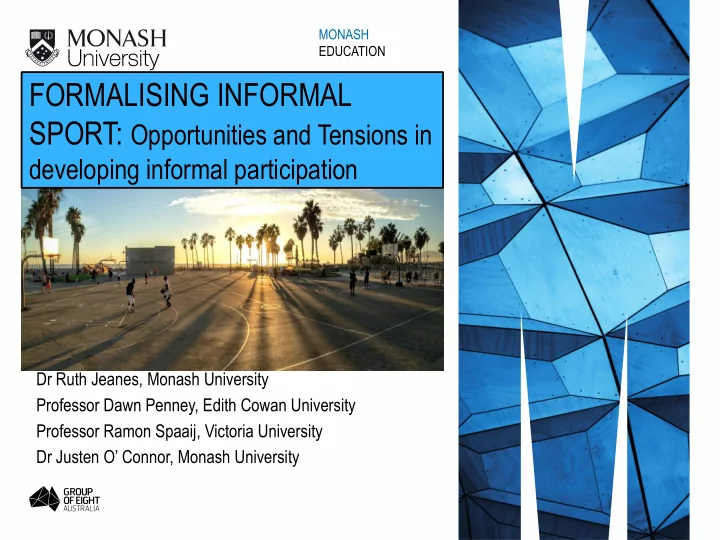

MONASH EDUCATION FORMALISING INFORMAL SPORT: Opportunities and Tensions in developing informal participation Dr Ruth Jeanes, Monash University Professor Dawn Penney, Edith Cowan University Professor Ramon Spaaij, Victoria University Dr Justen O’ Connor, Monash University
Introduction Significant changes in sport participation trends (ABS, 2014) Previous decade dropped in organised participation Rise in unstructured informal participation Response to ‘liquid’ modernity (Bauman, 2013) & ‘liquid leisure ( Blackshaw, 2010) General lack of response from policy makers and practitioners (CSIRO, 2013) Consider some of the challenges and opportunities Managing sport in ‘liquid’ times Focus on informal participation in traditional sport MONASH EDUCATION 2
Literature review • Mainly focused on ‘lifestyle’ sports • Explored issues of identity and subculture (Wheaton 2013, 2016; 2017) • Highlighted health and social benefits (Gilchrist & Wheaton, 2017; King & Church, 2015) • More recent focus on issues of governance (Sterchele & Ferrero- Camoletto, 2017) • Regulation of Parkour (Gilchrist & Osborn, 2017; Wheaton & O’Loughlin, 2017), development of coach education • ‘Selling out’ of informal values • Issues of contested space (Gilchrist & Osborn, 2017) MONASH EDUCATION 3
Methodology Interviews with sporting and community stakeholders State Sport Association representatives (2) Local Authority Sport Development officers (3) Community group representative (2) All working in diverse and disadvantaged areas Various interactions with informal sport In-depth semi structured interviews, Observations of informal participation MONASH EDUCATION 4
Findings : Benefits ‘it helps them settle, it builds social cohesion within the community. I think it obviously keeps them physically active and healthy. It has a huge benefit there. I know for their mental wellness, it definitely keeps - it has all of those physical and mental wellbeing aspects of physical sport; it’s just done in a different way. It would get the same benefits as you and I going to play at a club, but the thing is there’s no cost to it, it’s affordable, it’s with their mates, and…it’s empowerment for them, because they’re determining; they’re not being told by anyone what to do. It’s a completely community capacity-building activity because they organise’ ( Narresh LGA officer) MONASH EDUCATION 5
Tensions: Clashes with Existing Sporting Structures ‘there is so much informal participation but we are not here to support that, our role is to ensure we support those clubs that are paying membership fees and part of the system and pathway. We exist to support them so we have to make sure they are our priority focus.’ (Robyn SSA officer) … at the moment sports associations are funded on the number of affiliated members they have, there might be pockets of funding for informal opportunities but their core funding comes from supporting structured pathways and talent development. Unless we shift to a genuine participation model it is unlikely sports associations will place significant importance on supporting informal opportunities. (Asha, community worker) MONASH EDUCATION 6
Ownership of space ‘yes a club will have a problem with thirty Sudanese lads using “their” pitch regardless of whether they cause any damage because they don’t think they should be there’. ( Narresh, LGA officer) ‘There’s just no discussion or communication. Why are we only building facilities that we want sports clubs to use when we’ve got a small percentage of the population playing structured sport and the rest aren’t….But having an understanding of what they’re actually doing means that we could at least provide facilities that would cater for those needs and probably build more multiuse facilities’ ( Narresh, LGA officer) MONASH EDUCATION 7
Discussion & Conclusions • Informal participation considerable growth area • Currently sporting systems and structures not able to support or manage participation • Paradox of organisations seeking to promote participation tend to limit/reduce opportunities. • New models of development/management required • Reconceptualisation of what sport is and what type of participation is valued. MONASH EDUCATION 8
Recommend
More recommend